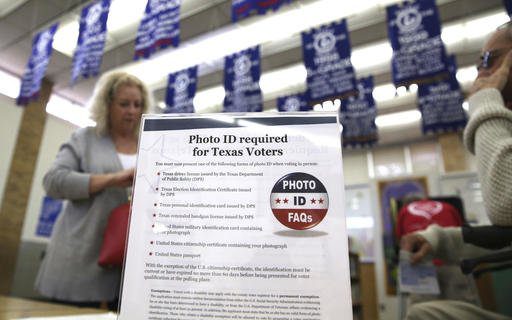
RALEIGH — A three-judge panel ruled Friday that voter ID implementation can move forward in North Carolina, dismissing all but one of the six claims in a lawsuit challenging legislation implementing a constitutional amendment approved by voters last fall.
While the judges did not completely dismiss the case, the court won’t stop IDs from being required in upcoming elections as the case continues forward. The case, Holmes v. Moore, was a state court challenge brought by the Southern Coalition for Social Justice in Wake County.
Voters last November passed a constitutional amendment requiring voter ID. The court ruled Friday that the six voters challenging the resulting law presented enough evidence on one claim to keep going but denied their request for a preliminary injunction, which would have blocked implementation of the law.
The plaintiffs allege the law passed last December was intentionally discriminatory and violated the state constitution. One judge said the law excluded government-issued IDs for public housing or benefits used disproportionately by black voters.
Responding to the ruling, Senate Leader Phil Berger (R-Eden) called the result “a huge win for the people of North Carolina who delivered a clear mandate last fall that they want common-sense protections against voter fraud.” Berger also said that the ruling, which denied a request to block the implementation of the voter ID provisions, signaled that the court believed the claim that was not dismissed was unlikely to succeed.
“Today a bipartisan three judge panel denied an attempt by a group of liberal activists to delay implementation of voter ID which was approved by a majority of North Carolinians at the polls last November,” said Berger.
House Speaker Tim Moore (R-Kings Mountain) issued a statement after the ruling saying that the “law accommodates all voters’ access to a secure ballot with commonsense standards already in place in most states.”
While Republicans are hailing the ruling in Holmes v. Moore, a separate lawsuit by the state NAACP is still pending. Wake County Superior Court Judge Bryan Collins in February invalidated the voter ID amendment and an amendment to lower the cap on income tax rates when he found that the General Assembly “did not represent the people of North Carolina.”
Legislative leaders have appealed that case to the Court of Appeals. In that case, Democratic Gov. Roy Cooper has asked the Court of Appeals to uphold the lower court ruling that struck down two state constitutional amendments approved by voters last year.
Cooper’s brief says the Republican-dominated General Assembly that proposed the amendments was tainted by “widespread and serious” racial gerrymanders, so it didn’t truly represent North Carolina citizens. Agreeing with the state NAACP that initially sued, the brief says such an “illegitimate legislature” diminishes popular sovereignty.
In mid-July, the state Supreme Court said the challenge won’t take the express lane to North Carolina’s highest court. Justices on the North Carolina Supreme Court said that they won’t hear the state NAACP’s lawsuit before the state Court of Appeals does.
The Court of Appeals already has prevented Collins’s ruling from being implemented while it’s on appeal at the state’s second highest court.
The Associated Press contributed to this report.



